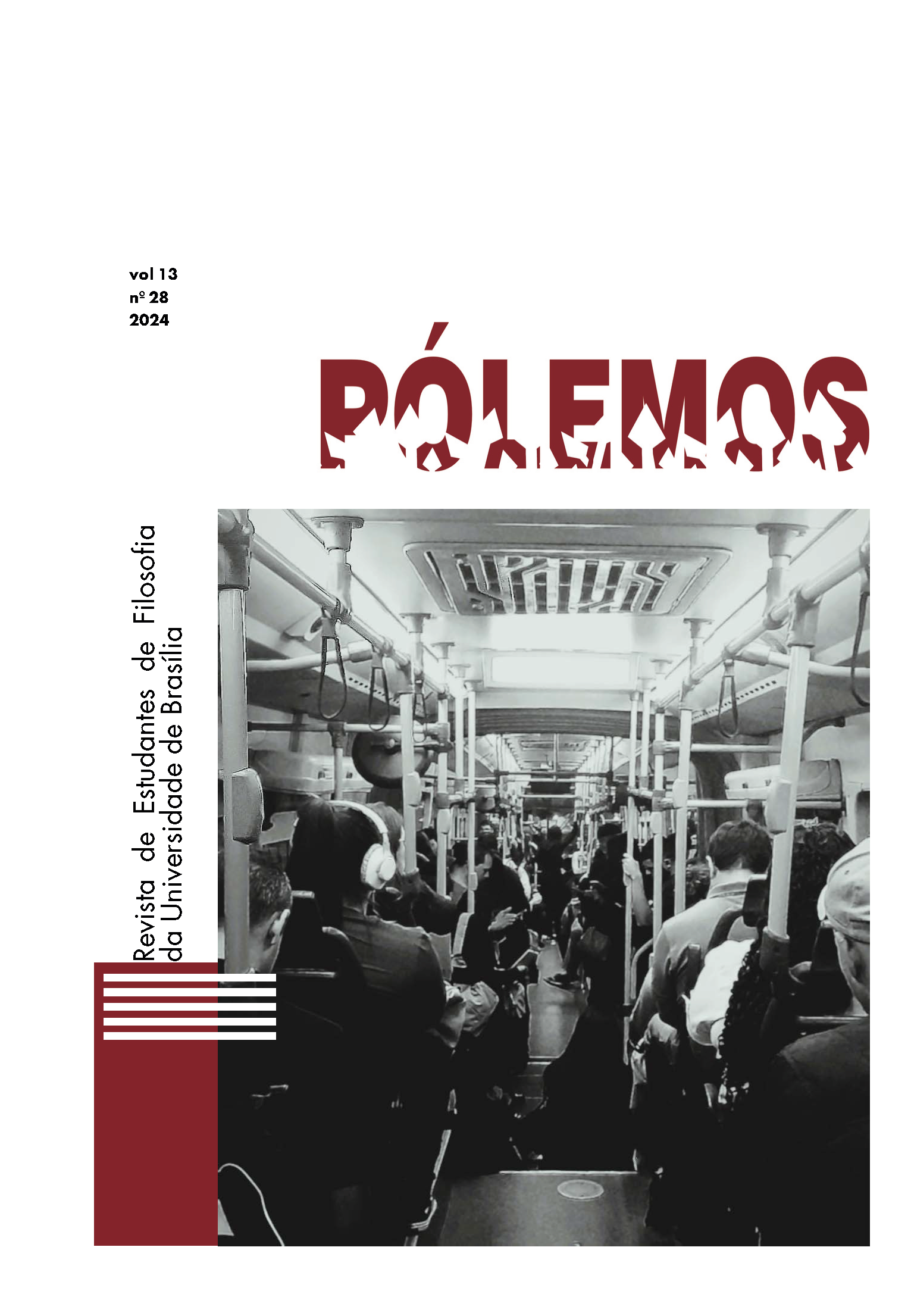AUTOPREDICAÇÃO E A IDEIA DE BEM NA REPÚBLICA DE PLATÃO
DOI:
https://doi.org/10.26512/pl.v13i28.54189Palavras-chave:
Ideia. Bem. Autopredicação. República. Platão.Resumo
No século XX, a partir da análise do Símile do Sol da República de Platão, construíram-se muitas interpretações complexas do papel da Ideia de Bem na metafísica platônica. Dentre as interpretações de maior destaque, encontra-se aquela erigida por Gerasimos Santas (1980), cuja originalidade se deve ao fato de ela estar alicerçada sobre um arcabouço conceitual desenvolvido por especialistas de vertente analítica a partir de uma passagem dos Tópicos aristotélicos (Owen, 1968; Keyt, 1969 & 1971; Vlastos, 1965 & 1972; etc.). Com base nessa passagem, esses estudiosos identificam uma distinção de atributos das Ideias platônicas, a qual é utilizada por Santas para definir o papel da Ideia de Bem como “a Ideia das Ideias”, i a Ideia que é a causa de as outras Ideias serem Ideias. O presente artigo avalia os pressupostos da interpretação de Santas da Ideia de Bem, defendendo, à luz dos estudos de Vlastos, sua incompatibilidade com o texto dos diálogos.
Downloads
Referências
ALLEN, R. E. Participation and Predication in Plato's Middle Dialogues. In: ALLEN, R. E. (ed.). Studies in Plato's Metaphysics. London: Routledge and Kegan Paul, 1967, pp. 43-60. (1a. ed. 1960)
ARISTOTE. Topiques. Tome I. Livres 1-4. Trad. J. Brunschwig. Paris: Les Belles Lettres, 1967.
ARISTOTE. Topiques. Tome II. Livres 5-8. Trad. J. Brunschwig. Paris: Les Belles Lettres, 2007.
ARISTÓTELES. Tópicos. Tradução de L. Vallandro e G. Bornheim. São Paulo: Abril Cultural, 1973 (Coleção Os Pensadores).
ARISTOTLE. Topics. Books I and VIII. Transl. by R. Smith. Oxford: Clarendon Press, 2003 (1997).
ARISTOTLE. Posterior Analytics. Topica. Transl. by H. Tredennick and E. S. Forster. Cambridge: Harvard University Press, 1955.
BRAGA DA SILVA, A. L. Platão, o Bem, e a fragilidade da jangada humana. Um estudo sobre o Símile do Sol na República. São Paulo: FFLCH / USP, 2017 (Tese). Disponível em: https://www.teses.usp.br/teses/disponiveis/8/8133/tde-18072017-160906/publico/2017_AndreLuizBragaDaSilva_VCorr.pdf. Acesso em: 05 jun. 2024.
BRAGA DA SILVA, A. L. The “Ideas as thoughts” hypothesis of Parmenides 132b-c: an historical approach. In: BRISSON, L.; RENAULT, O.; MACÉ, A. (Org.). Plato's Parmenides. Selected Papers of XII Symposium Platonicum. Baden-Baden: Academia / Nomos Verlag / International Plato Society, 2022, pp. 59-66.
BRAGA DA SILVA, A. L. Does Plato revise his ontology in Sophist 256a? Notes on the 'being' of the Ideas. In: BRISSON, L.; HALPER, E.; PARRY, R. (Org.). Plato's Sophist. Selected Papers of the XIII Symposium Platonicum. Baden-Baden: Academia / Nomos Verlag / International Plato Society (no prelo).
CHERNISS, H. Aristotle's criticism of Plato and the Academy. Baltimore: Johns Hopkins Press, 1946. (1a. ed. 1944)
FINE, G. (ed.) Plato. 1, Metaphysics and Epistemology. Oxford: Oxford University Press, 1999.
KEYT, D. "Plato's paradox that the Immutable is Unknowable". Philosophical Quartely 19 (1969), p. 1-14.
KEYT, D. The mad craftsman of the Timaeus. Philosophical Review, v. 80, n. 2, p. 230-235, 1971. Disponível em: https://www.jstor.org/stable/2184032. Acesso em: 05 jun. 2024.
OWEN, G. E. L. Dialectic and Eristic in the treatment of Forms. In: OWEN, G. E. L (ed.). Aristotle on Dialectic: the Topics. Proceedings of the Third Symposium Aristotelicum. Oxford: Clarendon Press, 1968, pp. 103-125. [Reeditado em: OWEN, G. E. L.; NUSSBAUM, M. C. (ed.). Logic, science, and dialectic: collected papers in Greek philosophy. Ithaca, New York: Cornell University Press, 1986.]
ROSS, W. D. Plato's Theory of Ideas. Oxford: Clarendon Press, 1953. (1a. ed. 1951)
SANTAS, G. The Form of the Good in Plato's Republic. Philosophical Inquiry (1980). [Reeditado em: ANTON, J. P.; PREUS, A. (ed.) Essays in Ancient Greek Philosophy vol. II. Albany: State University of New York Press, 1983; e em FINE, G. (ed.) Plato. 1, Metaphysics and Epistemology. Oxford: Oxford University Press, 1999, pp. 247-274.
SHIELDS, C. Surpassing in Dignity and Power: The Metaphysics of Goodness in Plato's Republic. In ANAGNOSTOPOULOS, G. (ed.). Socratic, Platonic and Aristotelian Studies: Essays in Honor of Gerasimos Santas. London: Springer Science+Business Media, 2011, pp. 281-296. DOI: http://dx.doi.org/10.1007/978-94-007-1730-5_17.
VLASTOS, G. A metaphical paradox. In: VLASTOS, G. Platonic Studies. Princeton: PUP, 1973, pp. 43-57. (1a. ed. 1965/1966) ["1973a"].
VLASTOS, G. Degrees of reality. In: VLASTOS, G. Platonic Studies. Princeton: PUP, 1973, pp. 58-75. (1a. ed. 1965) ["1973b"].
VLASTOS, G. Reason and Causes in the Phaedo. In: VLASTOS, G. Platonic Studies. Princeton: PUP, 1973, pp. 76-110. (1a. ed. 1969) ["1973c"].
VLASTOS, G. Self-predication in Plato’s Later Period. In: VLASTOS, G. Platonic Studies. Princeton: PUP, 1973, pp. 335-341. (1a. ed. 1969) ["1973d"].
VLASTOS, G. The Unity of Virtues in the Protagoras. In: VLASTOS, G. Platonic Studies. Princeton: PUP, 1973, pp. 221-265. (1a. ed. 1972) ["1973e"].
VLASTOS, G. An Ambiguity in the Sophist. In: VLASTOS, G. Platonic Studies. Princeton: PUP, 1973, pp. 270-308. ["1973f"].
VLASTOS, G. The “Two-Level Paradoxes” in Aristotle. In: VLASTOS, G. Platonic Studies. Princeton: PUP, 1973, pp. 323-334. ["1973g"].
Downloads
Publicado
Como Citar
Edição
Seção
Licença
Copyright (c) 2024 PÓLEMOS – Revista de Estudantes de Filosofia da Universidade de Brasília

Este trabalho está licenciado sob uma licença Creative Commons Attribution-NonCommercial-NoDerivatives 4.0 International License.
Todos os trabalhos que forem aceitos para publicação, após o devido processo avaliativo, serão publicados sob uma licença Creative Commons, na modalidade Attribution-NonCommercial-NoDerivatives 4.0 International Public License (CC BY-NC-ND 4.0). Esta licença permite que qualquer pessoa copie e distribua a obra total e derivadas criadas a partir dela, desde que seja dado crédito (atribuição) ao autor / Ã autora / aos autores / às autoras.


